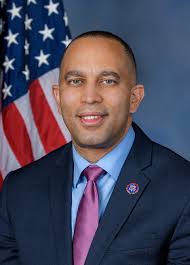Hakeem Jeffries: A Look at His Political Journey

Introduction
Hakeem Jeffries, the Democratic Representative from New York’s 8th congressional district, has emerged as a significant political figure in the United States. As the newly elected leader of the House Democrats, he plays a critical role in shaping policy and guiding party strategy. His rise reflects broader demographic shifts and evolving political landscapes in America, making his influence noteworthy.
Career Overview
Born in Brooklyn, New York, in 1970, Jeffries graduated from Binghamton University before earning his Juris Doctor at New York University School of Law. After practicing law, he entered politics in 2013 when he was elected to the House of Representatives. His tenure has been characterized by his commitment to social justice, education, and healthcare reform. He has become a prominent voice against systemic inequalities and has been vocal on issues ranging from criminal justice reform to gun control.
Recent Developments
In November 2022, Hakeem Jeffries was elected to succeed Nancy Pelosi as the leader of the House Democratic Caucus, making him the first African American to hold this position. His leadership comes at a crucial time as the Democratic Party faces challenges from a Republican-majority House. During his tenure, he has emphasized unity within the party and aims to connect more effectively with younger and diverse voters. His strategic focus includes addressing pressing issues such as rising inflation, economic inequality, and climate change.
Challenges Ahead
As Hakeem Jeffries steps into his leadership role, he must navigate several challenges. The increasing polarization in Congress, coupled with complex national issues, presents significant hurdles. One of Jeffries’s immediate tasks is to unify the Democratic Party while also addressing the needs of various factions within it. Additionally, in the lead-up to the 2024 elections, he will need to effectively communicate the party’s vision to voters who may feel disillusioned.
Conclusion
Hakeem Jeffries’s ascent in American politics signals a shift towards more diverse representation in leadership roles. His ability to connect with constituents and advocate for progressive policies will be tested in this evolving political climate. As he takes on his new responsibilities, his actions will likely have lasting implications for the Democratic Party and American governance as a whole. His leadership may be pivotal in steering the party’s direction and responding to an increasingly dynamic electorate.









